As anger over incoming tax hikes boils over in Kenya, African Stream takes a deep dive into the role the International Monetary Fund (IMF) has played in ramming austerity down Africans’ throats. It boils down to neocolonial debt slavery, a system designed to oppress Africans, while oiling the wheels of otherwise faltering Western economies. African Stream’s Kenneth Kaigua breaks down this complex issue.
Related Articles
Related Articles
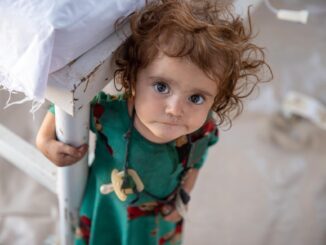
As UN ‘Reviews’ Presence in Afghanistan, Afghans Face More Hunger and Poverty
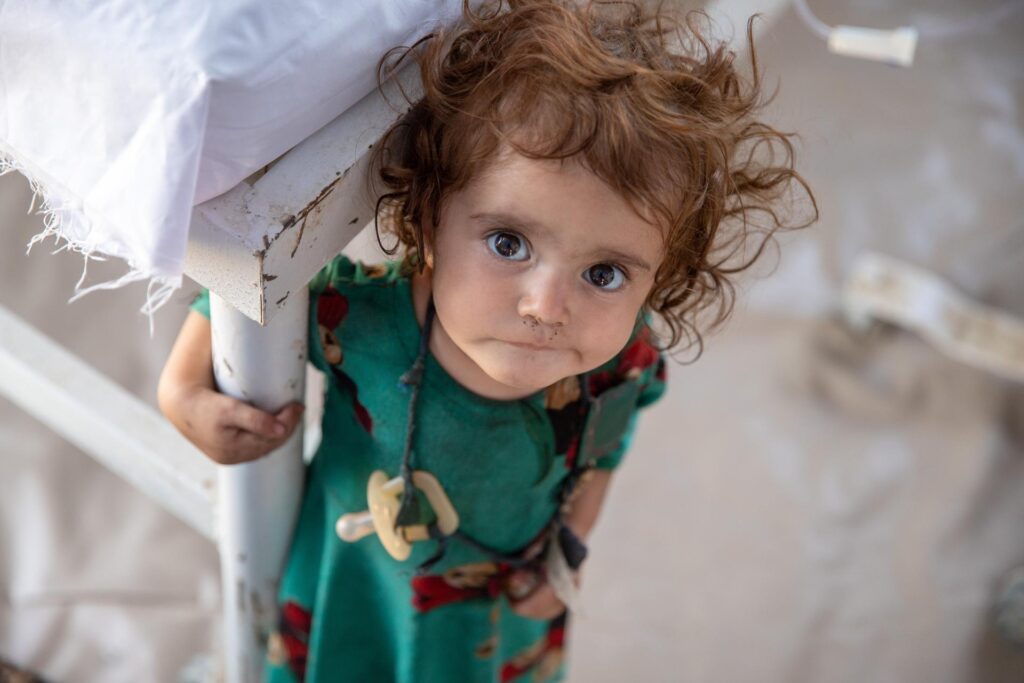
This article was produced by Peoples Dispatch/Globetrotter News Service.
As Afghanistan’s economy continues to spiral, as many as 34 million Afghans are living below the poverty line, says a new UN report. The “Afghanistan Socio-Economic Outlook 2023” report released by the United Nations Development Programme (UNDP) on April 18 highlights the impact of cuts in international aid to Afghanistan since the Taliban took power.
The report notes that the number of people below the poverty line in Afghanistan has increased from 19 million in 2020 to 34 million today. It also adds, “Even if the UN aid appeal for international assistance to reach $4.6 billion in 2023 succeeds, it may fall short of what is needed to improve conditions for millions of Afghans.”
The UNDP report comes after the UN said that it was “reviewing its presence” in Afghanistan following the Taliban’s ban on Afghan women from working for the international organization earlier this month. The UN statement suggested that it may be planning to suspend its operations in the country.
The report also notes that Afghanistan is currently facing a severe fiscal crisis after the ending of foreign assistance “that previously accounted for almost 70 percent of the government budget.” A severe banking crisis also continues. In 2022, Afghanistan’s GDP contracted by 3.6 percent. The report adds that the average real per capita income has also declined by 28 percent from the 2020 level.
On May 1, the UN began holding crucial talks regarding Afghanistan in Doha. The participants include the five permanent UN Security Council members, countries in the region such as Pakistan, India, Uzbekistan, and Tajikistan, and key players such as Saudi Arabia and Turkey. Notably, the de facto Taliban government of Afghanistan was not invited to participate. “Any meeting about Afghanistan without the participation of the Afghan government is ineffective and counterproductive,” said Abdul Qahar Balkhi, Taliban foreign ministry spokesman.
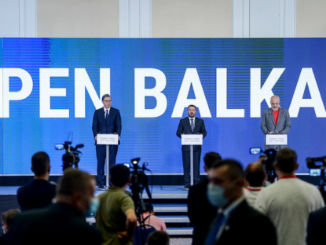
Open Balkans Initiative: Continuity of Western Neocolonialism?
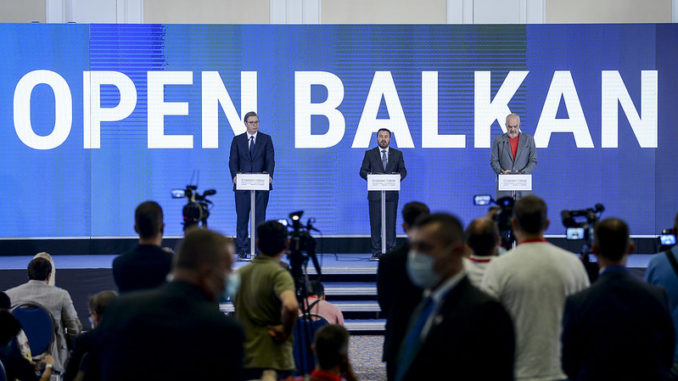
The European Union’s process to add new member states has stalled over the last decade. Quite aware that their nations will not join the EU anytime soon, if at all, leaders of three Balkan nations—Serbia, North Macedonia and Albania—have started their own economic integration process.
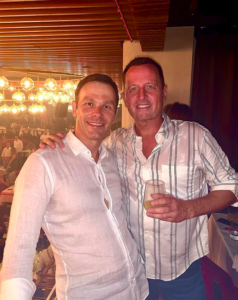
On July 29, in the North Macedonian capital of Skopje, Serbian President Aleksandar Vucic and prime ministers of North Macedonia and Albania, Zoran Zaev and Edi Rama, respectively, agreed to abolish border controls between the three countries starting January 1, 2023. The Balkan leaders also signed agreements facilitating trade and movement, cooperation in dealing with disasters, and freeing the labor market by removing work permit requirements and simplifying procedures. The initiative has been dubbed “Open Balkans.” Initially, it was named “Mini Schengen,” in an ode to the Schengen Area, the EU’s passport-free and duty-free zone made up of 26 European countries. During the Skopje summit, the initiative was re-branded “Open Balkans.”
Such moves were welcomed by the EU and the United States, two major powers operating in the Balkans. In fact, it is believed Richard Grenell, then-U.S. President Donald Trump’s special envoy to the Balkans, initiated economic integration between Serbia, North Macedonia and Albania in October 2019.
It may have been a coincidence that a day after the Skopje summit, Grenell was spotted with Serbian Finance Minister Sinisa Mali in a local night club in the Serbian capital of Belgrade. Just a couple of days later, he went to Albania, where he met with Rama.
Although the former U.S. diplomat is not part of the new U.S. administration, he appears to wield influence in the Balkans. The role he plays on behalf of the United States is unclear. During a recent visit to Albania, he reportedly said the self-proclaimed Republic of Kosovo—which is the subject of a long-running political and territorial dispute between the Serbian government and Kosovo leaders based in the city of Pristina—made a mistake by not joining the Open Balkans initiative. Besides Kosovo, Montenegro, as well as Bosnia and Herzegovina, also remain skeptical about this project. The EU, on the other hand, supports the German-backed Common Regional Market, which includes Serbia, North Macedonia, Albania, Bosnia and Herzegovina, Montenegro, and Kosovo. In other words, it seems certain U.S. players, namely Grenell and the Atlantic Council, support the Open Balkans project, while Germany pushes for Balkan nations to more deeply integrate into the Common Regional Market.
The @AtlanticCouncil team was honored to meet with President Vučić, Prime Minister @ediramaal and Prime Minister @Zoran_Zaev , today in Skopje, for the launch of #OpenBalkan pic.twitter.com/Dh4TKQPBm8
— Benjamin Haddad (@benjaminhaddad) July 29, 2021
Integrating the Balkans
It is worth noting, however, that EU member Austria, which has significant economic influence in the region, supported the creation of Open Balkans, which some see as a Serbia-centric, Yugoslavia-style initiative, especially if Montenegro as well as Bosnia and Herzegovina—where ethnic Serbs comprise around 30 percent of the population—become part of Open Balkans. Many Serbs, on the other hand, fear Open Balkans could turn into a “Greater Albania” if Kosovo—where ethnic Albanians make up over 90 percent of the population—joins the initiative. In reality, this entity could unite all the Serbs and Albanians living in the Balkans.
“This initiative is changing everything in the region,” said Serbian President Aleksandar Vucic. “We will have to work a lot and I believe that we will succeed.”
The initiative might already be changing the region. For instance, Serbian and North Macedonian national postal services have reportedly agreed to initiate the establishment of a common postage stamp and a single price for parcel services, in order to provide citizens of Open Balkan countries with services at a single tariff. This move has been viewed as an initial step in practically implementing Open Balkans.
On the other hand, prime ministers of Montenegro and Albania, Zdravko Krivokapic and Edi Rama, have recently opened a joint border crossing between the two Balkan countries. Montenegro now has three common border crossings, two with Albania and one with Bosnia and Herzegovina. Moreover, on July 1 the region became a “roaming-free zone,” which means no roaming charges for people using their mobile phones while travelling between or in Serbia, Albania, North Macedonia, as well as Bosnia and Herzegovina, Montenegro, and Kosovo. The European Union supported this initiative, which suggests that both Brussels and Washington aim to include the Balkan nations that are still out of the EU into a joint regional entity, be it Open Balkans or Common Regional Market.
Neocolonialism in the Balkans?
No part of either project, however, is Balkan-made. Rather, these efforts are intended to advance foreign powers’ wider geopolitical strategies.
In the past—particularly in the 19th and in the first half of the 20th century—the people of the Balkans were clear the Balkans should belong to them. When they were freed from the centuries-old feudal system the Ottoman Empire and the Austro-Hungarian monarchy had imposed, the newly formed nations took the first political steps in an effort to emancipate themselves and cease to be colonies in Europe. To this day, however, the Balkan nations remain heavily dependent on Western powers, and some claim the EU treats the region in a neocolonial manner. Neocolonialism involves an outside power ruling a country by indirect means.
The United States has applied a similar pattern with Balkan countries, regardless of which political party’s representative sits in the White House. Nowhere was that more obvious than in the White House in September 2020, when leaders of Serbia and Kosovo signed a “historic” economic agreement, although the document they signed looked more like a list of U.S. demands that was addressed to its Balkan client states. The major points in the document involved normalizing relations with Israel.
But some speculated the Serbian president didn’t know what he had signed, based on video footage that went viral on social media. In that video, when Trump mentioned the Embassy of Serbia located in Tel Aviv would move to Jerusalem, Vucic began to turn the pages of the document, looked to his right and brought his hand to his head.
Footage that certainly makes it appear that Vucic did not realize he had agreed to moving the Serbian embassy to Jerusalem — or at least not by July, Trump states. Comedy of errors. pic.twitter.com/nhBjfja0lc
— Paul 🏴☠️ the other one… (@paulcshipley) September 6, 2020
Moreover, a photograph of Vucic sitting in the Oval Office also went viral because some said Vucic looked like a schoolboy who had been summoned by Trump, further cementing the popular notion that Serbia is under the U.S. thumb.
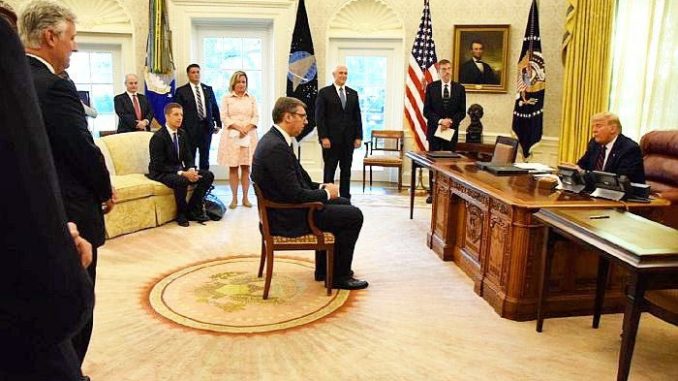
Meanwhile, the Biden administration’s relationship to the Balkans has been similar to the Trump administration’s. That is, until Biden indicates otherwise.
“We still don’t know what the Biden administration’s attitude is towards the Balkans,” said John Bolton, a national security advisor in the Trump administration. “Biden’s campaign has avoided answering many foreign and domestic questions, and I think the Biden administration is focusing on domestic issues at the moment, not foreign policy, so I don’t know when we will get an answer to that question.”
For now, self-determination for the region is unlikely with an initiative like Open Balkans. The region appears to remain stuck in the waiting room to join the EU, while foreign powers fight for influence and redistribution of Balkan nations’ wealth.
Nikola Mikovic is a Serbia-based contributor to CGTN, Global Comment, Byline Times, Informed Comment, and World Geostrategic Insights, among other publications. He is a geopolitical analyst for KJ Reports and Global Wonks.
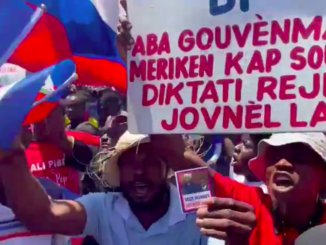
This Is Not a Crisis—This Is a Rebellion: A Report from the Front Lines of Haiti
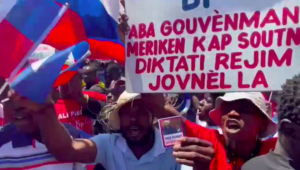
All of Haitian society is in revolt.
A mambo and hougan—the traditional voudou priestess and priest—lead ancestral ceremonies before rallies take the streets and block the central arteries of Port-au-Prince, Cap Haïtien, and other Haitian cities and towns. After one of their members was kidnapped, leaders of the Protestant Church directed its congregation to halt all activities at noon on Wednesday and bat tenèb. Bat tenèb, literally “beat the darkness,” is a call for all sectors of Haitian society to beat pots, pans, street lights and anything else as a general alert of an emergency. A Catholic church in Petionville held a mass with political undertones against the dictatorship. When marchers from outside took refuge from the police inside the church, the Haitian National Police tear gassed the entire congregation.
Ti Germain, a well-known Lavalas activist, was hauled away by President Jovenel Moïse’s henchmen for protesting in the downtown Chanmas Plaza last week and has not been seen since. Peasants come together to form self-defense units against land grabs by the Haitian Tèt Kale Party (PHTK, or Haitian Bald Headed Party) and their foreign backers before mobilizing in the streets themselves. With the spiritual hymn of resistance blaring from a sound truck, “A fight remains a fight. My sword is in my hand, I’m moving forward,” tens of thousands of protesters move toward police lines guarding the Delmas 96 entrance, which seals off the Haiti of the 0.01 percent from that of the 99.99 percent.
Showdown: the police, the ruling class & imperialism vs the Masses of People 🇭🇹 Which side are you on? #Haiti 🇭🇹 pic.twitter.com/sxRhwaDN90
— Danny Shaw (@dannyshawcuny) March 29, 2021
Chanting “The People Poetry Revolution!”, young writers and poets took to the streets on May 3 calling for a Haiti where youth have a future. A cultural worker, Jan Wonal, asserts, “They [the imperialists] fashion themselves the messengers of art, literature, history of art. So, for us, cultural revolution against cultural imperialism is an imperative.”
All of Haitian society is in revolt.
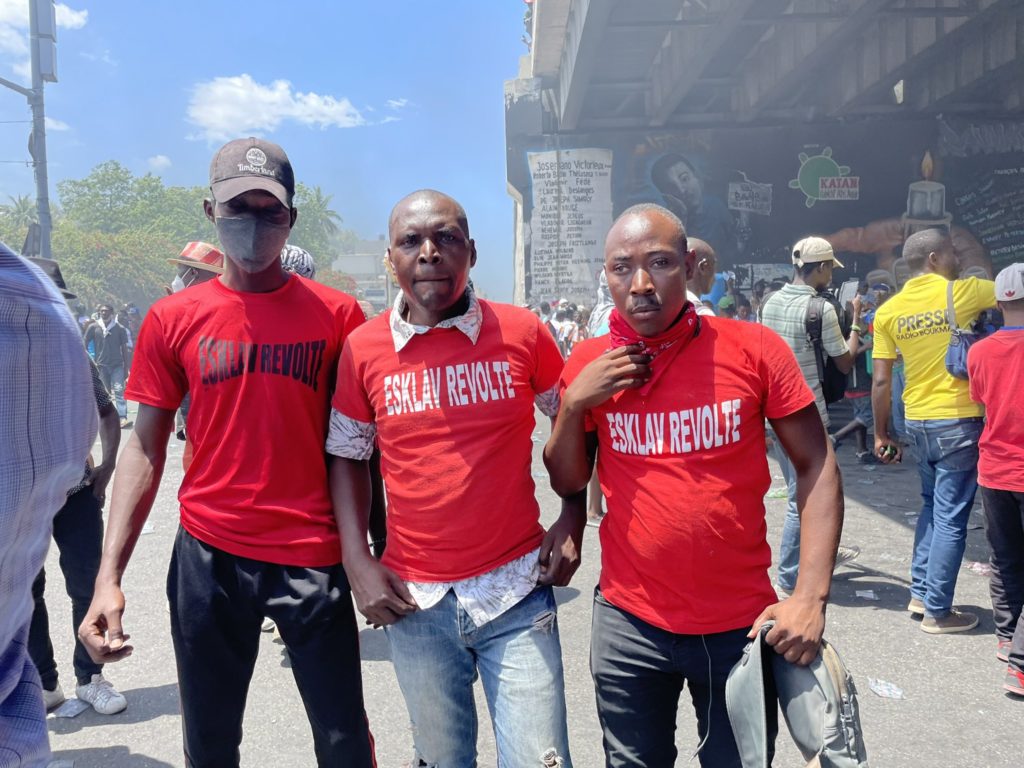
Who Cares About Haiti?
CNN, MSNBC, Fox, and the full gamut of mainstream media outlets have paid scant attention to this social insurrection. The headlines—if they mention Haiti at all—have focused on U.S. Immigration and Customs Enforcement (ICE) and the Biden regime’s deportation of Haitians to the “civil unrest” of Haiti. The anti-neoliberal rebellion goes unmentioned.
According to one protestor at a mass demonstration, “If we were Hong Kong, Taiwan or in any country the U.S. lists as an enemy, there would be everyday coverage of our movement.”
Solidaridad con el pueblo haitiano 🇭🇹 #Haití Que viva el internacionalismo! pic.twitter.com/YviAUzrxXu
— Danny Shaw (@dannyshawcuny) March 28, 2021
The corporate press only mentions Haiti in the context of a natural disaster, a deadly disease or chaos. Millions of people in motion in a U.S. neocolony like Colombia, Chile or Haiti are not deemed newsworthy. The dominant narrative is people in the streets protesting is not a revolt, but a “political crisis.” It is not convenient for a neocolony to make noise and rise up against the empire’s handpicked lackeys and puppets.
In response to the media whiteout, Haitian intellectual Patrick Mettelus emphasized, “Our national liberation struggle is first and foremost a battle of ideas; it is an informational war. How can we counter the dominant narrative and show what is good, beautiful, encouraging and hopeful from our homeland?”
Showdown: Haiti vs. Imperialism
Ignoring months and years of widespread anger, Moïse continues to say resigning is not an option. The United Nations and Organization of American States (OAS) agree the U.S.-backed despot has another year remaining in his presidency, even though the 1987 Constitution stipulates his term ended on February 7. Former president Jean Bertrand Aristide called the UN, OAS and United States “the troika of evil” for the heavy-handed role they have played in Haiti’s historic destiny. This alone explains why Aristide was twice the victim of coup d’etats orchestrated by these neocolonial forces.
Moïse went before the United Nations General Assembly on February 24. In a 28-minute display of arrogance, the tone-deaf puppet patted himself on the back for supposedly carrying out ongoing socio-economic reforms. Adding insult to injury, Moïse now intends to brazenly overturn the 1987 constitution. This constitution was the result of consultations among hundreds of local committees representing all sectors of society一women, peasants, poor neighborhoods, etc.一coming together on the heels of the 1986 dechoukaj (uprooting) that overthrew dictator Jean Claude “Baby Doc” Duvalier. Enshrined in the constitution is protection of Haitian cultural and economic sovereignty, and women’s empowerment, among other democratic rights. Today, these same sectors, representing the vast majority of Haitian society, are taking to the streets against Moïse and his dictatorial scheme to overturn the people’s constitution.
The reformist wing of the opposition has propped up a transition president, Joseph Mécène Jean-Louis, who has been in hiding since February 7, in fear of persecution of Jovenel’s National Intelligence Agency (ANI). Ruling class families such as the Vorbe/Boulos faction, which supported Jovenel (and Michel Martelly before) have now turned on Moïse and want to replace him without systemic change.
Kidnappings have reached epic proportions. The djaspora (Haitians in the diaspora) are afraid to travel back home. The Center for Human Rights Research and Analysis reported 157 kidnappings in the first three months of 2021. This lawlessness is representative of a society that has lost all confidence in Moïse. The most oppressed layers of society have been overwhelmed by the weak gourde (1 U.S. dollar equals 87 Haitian gourdes), widespread joblessness and no hopes for a dignified future. According to the UN’s World Food Program, half of Haiti’s 10.7 million people are undernourished. This bleek social reality has pushed the most castaway to resort to armed violence and taking hostages.
The fundamental demand of the popular sectors is a “sali piblik,” or a united transition away from dictatorship and neocolonialism that involves and empowers the masses of Haitian people.
While the corporate media silences Haitian voices, the Committee for Mobilization Against Dictatorship in Haiti (KOMOKODA), Leve Kanpe, the U.S./UN Out of Haiti Coalition, and other diaspora and anti-imperialist organizations across the United States and the world are standing with the historic Haitian rebellion.
“The ‘Core Group’ is a cabal of predatory countries and institutions created by the United States of America after the overthrow and kidnapping of President Aristide in 2004 to give a veneer of international legitimacy to their domination over Haiti,” KOMOKODA stated as the group protested May 3 in front of the French embassy in Port-au-Prince, “Join us as we stand in solidarity with the Haitian people, who are in the streets fighting for their liberation and their emancipation.”
Danny Shaw is a professor of Caribbean and Latin American Studies at the City University of New York. Since the most recent rebellion began on February 7, he has traveled to Haiti twice to stay with the mass anti-imperialist movement. A Senior Research Fellow at the Center on Hemispheric Affairs, Danny is fluent in Haitian Kreyol, Spanish, Portuguese and Cape Verdean Kriolu.
